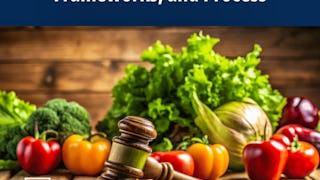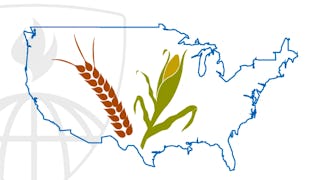This course, "U.S. Nutrition Policies and Implications," offers an exploration into federal food assistance programs and their impact on food security and public health nutrition. Over four modules, you'll delve into the scope and benefits of programs like WIC, SNAP, and CACFP, and understand the critical role of food pantries and emergency food assistance. You'll also examine the application of nutrition policies in educational and non-educational settings, including workplaces and healthcare environments. Led by Illinois instructors Dr. Saima Hasnin and Dr. Krystal Hodge, you'll embark on a journey through U.S. nutrition policy and implications, guided by expert guest lecturers from across the nation. By the end of the course, you'll be equipped to identify policy gaps, understand the challenges in U.S. nutrition policy, and explore the implications of nutrition policies on public health and well-being.


U.S. Nutrition Policies and Implications
包含在  中
中
您将学到什么
Throughout this course you will understand the critical role of food pantries and emergency food assistance.
Discover more about the major federal nutrition assistance programs like WIC, SNAP, NSLP, and CACFP.
Identify U.S. nutrition policy gaps and challenges of policy implementation.
Explore the implications of nutrition policy on public health nutrition and dietary behavior.
您将获得的技能
要了解的详细信息

添加到您的领英档案
6 项作业
了解顶级公司的员工如何掌握热门技能

积累特定领域的专业知识
- 向行业专家学习新概念
- 获得对主题或工具的基础理解
- 通过实践项目培养工作相关技能
- 获得可共享的职业证书

该课程共有4个模块
You will become familiar with the course, your classmates, and our learning environment. The orientation will also help you obtain the technical skills required for the course. Module 1 of the course will introduce you to the various federal food assistance programs, such as WIC, SNAP, and the Commodity Supplemental Food Program, and explain their scope, purpose, and benefits. Additionally, you'll learn about emergency food assistance programs, including food banks and the USDA's TEFAP, with insights from guest lecturer Mr. Steve Ericson from Feeding Illinois. Let's dive in and explore how these programs work to ensure food security for all.
涵盖的内容
14个视频6篇阅读材料2个作业1个讨论话题
In Module 2, you will learn about a few nutrition policy programs, including the Child and Adult Care Food Program (CACFP), the National School Lunch Program, the School Breakfast Program, the Universal School Meal Program, and the Summer Nutrition Program. Then, Dr. Susan Sisson will teach learners about the use of and policy gaps within the CACFP in tribal childcare setting. Lastly, you will have the pleasure of hearing about nutrition policy regarding college students from expert guest lecturer Cydney M. McGuire, an Assistant Professor in the School of Public and Environmental Affairs at Indiana University Bloomington. Ready to dig in and learn about how these nutritional policies positively benefit students in educational settings?
涵盖的内容
10个视频4篇阅读材料1个作业
In Module 3, you will gain an understanding of how nutrition policy is implemented in various non-educational settings, including the workplace, healthcare facilities, restaurants, and more. This module also highlights important legislation such as the Medical Nutrition Therapy Act, introduced by guest lecturer Dr. Justine Karduck, and gives insight into nutrition policy that aims to protect vulnerable consumers, such as children. Venture on to learn more about these important health care policies that protect settings and consumers outside of educational settings.
涵盖的内容
10个视频2篇阅读材料1个作业
In Module 4, from sugary drink policies to SNAP-Education, you will explore the effect of different nutrition policies on public health. You will also become familiar with the role of the government in implementing these nutrition policies, as well as some of the barriers and opportunities those policies present. Join us in our final module with guest lecturers Dr. Jennie Davis, Dr. Jennifer McCaffrey, Dr. Shellye Suttles, and Mr. Blake Connolly to see how public health is affected by these important nutrition policies.
涵盖的内容
11个视频8篇阅读材料2个作业
获得职业证书
将此证书添加到您的 LinkedIn 个人资料、简历或履历中。在社交媒体和绩效考核中分享。
从 Nutrition 浏览更多内容
 状态:免费试用
状态:免费试用University of Illinois Urbana-Champaign
 状态:预览
状态:预览Johns Hopkins University
 状态:免费试用
状态:免费试用University of Illinois Urbana-Champaign
 状态:免费试用
状态:免费试用National Academy of Sports Medicine
人们为什么选择 Coursera 来帮助自己实现职业发展




常见问题
Yes! Although completion of the Coursera course alone is not credit-bearing, it is a required component of a graduate-level Canvas course that can be "stacked" toward advanced credentials such as an academic (transcriptable) graduate certificate or a degree (external website). If you decide to pursue further education, the credits you earn from this course can be applied toward a formal academic program, provided that you meet all the requirements of admission to the certificate or degree.
To access the course materials, assignments and to earn a Certificate, you will need to purchase the Certificate experience when you enroll in a course. You can try a Free Trial instead, or apply for Financial Aid. The course may offer 'Full Course, No Certificate' instead. This option lets you see all course materials, submit required assessments, and get a final grade. This also means that you will not be able to purchase a Certificate experience.
When you enroll in the course, you get access to all of the courses in the Specialization, and you earn a certificate when you complete the work. Your electronic Certificate will be added to your Accomplishments page - from there, you can print your Certificate or add it to your LinkedIn profile.
更多问题
提供助学金,





